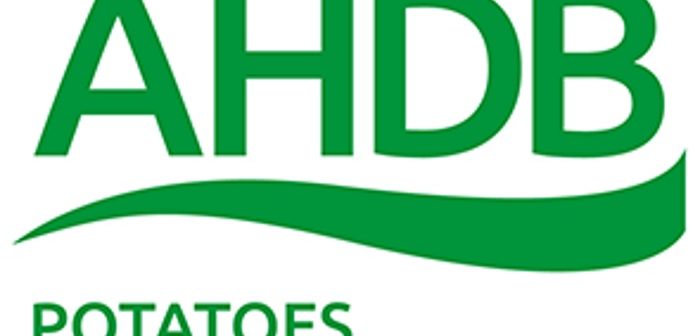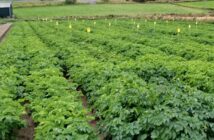Results from the first year at Elveden Farms, Strategic Potato Farm (SPot) East were revealed on Wednesday, 11 January 2017, as attendees of the event at Newmarket Racecourse tried to get a nose ahead by evaluating the research on display.
In an informative discussion, Dr Phil Burgess, Head of Knowledge Exchange for AHDB Potatoes, said: “Evaluating these results from the SPot Farm, I think we can say that small changes can make a big difference, if the timing is right.
“For example, I was surprised that quite small differences in irrigation regime can have an impact on the development of disease. In a demonstration designed to show efficient water use to control common scab we actually got more powdery scab development.
“The weather meant there was little difference between our frequent and infrequent irrigation regimes. It showed that too much water at a critical time can result in powdery scab in some varieties.
“Providing we time our application correctly, our results show that understanding varietal susceptibility is key to using water efficiently to control common scab.”
Dr Marc Allison set the early pace with a discussion on the effects of nitrogen and sulphur on Russet Burbank yield.
The interesting thing was that different irrigation regimes and nitrogen timing did not affect canopy growth or indeed yield. Why this had happened was a topic for discussion.
Graham Tomalin, potato specialist for Vegetable Consultancy Services (VCS UK) Ltd then lead by assessing the efficacy from a range of residual herbicide combinations trialled on the SPot farm.
Graham concluded that “more assessment of weed risks before planting need to be undertaken to ensure that the most resilient and cost effective programme is put in place as the increased costs had to be carefully considered.”
Part-funded by Belchim Crop Protection,12 residual herbicide combinations were used with the variety Maris Piper, and concluded that while all treatment combinations gave adequate control, three-way mixes were the most effective treatments.
Common scab and the effects of irrigation
Common scab is widely distributed in UK soils. It is caused by Streptomyces scabiei and other pathogenic Streptomyces species. Control strategies centre on growers keeping soil wet in the early season, from tuber initiation (TI), as a control strategy. Use of water for irrigation purposes is under significant scrutiny from a number of directions and this demonstration run by NIAB CUF, considered optimising irrigation to control common scab.
Dr Mark Stalham, research scientist of NIAB CUF and coordinator of some of the trials at SPot Farm East, said: “What we are looking to do is structure the irrigation programme to the actual needs of the potato variety and through this combine the control of common scab with efficient water use. If we can prioritise more susceptible varieties in our irrigation programmes, we may be able to target the more resistant varieties at exactly the right time and also reduce the risk of powdery scab and tuber cracking.”
The demonstration found that two new varieties not in the existing AHDB common scab control groups had a much shorter or longer time from emergence to TI and this knowledge will help time irrigation better.
Best or even better practice
At the finishing post, Jenny Bashford, AHDB Knowledge Exchange Manager coordinator for SPot Farm East gave personal thanks and recognition to host farmer, Andrew Francis, by saying: “Andrew’s best practice is already of a very high standard, but like all of those at the top of their game, he is always looking for better. These trials highlight the importance of measuring and monitoring in supporting management practices. Adding. “It is vital for growers to understand and use varietal attributes for the industry to move forward,”
We’ve shown that we can get some good results, but there is scope for even better.”
Host Andrew Francis concluded by saying: “This has been a very rewarding experience, my staff and I have gone through every emotion possible over the course of this season, so seeing value and results today has been a proud day for us.
“We hope you’ve been inspired in the same way we have. If we can get the same kind of result from a second year at Elveden we’ll be delighted.”
Matt Gregory, a grower from Greenwell Farms in Suffolk, said: “I came to the very first session at Elveden, so I was keen to find out the results.
“As a grower, these sessions are more relevant than they’ve ever been before As they’re focussed on the commercial aspects of growing potatoes.”
Peter Hewitt, Managing Director of Stet UK, said: “I’ve been really impressed with how today has been set up. We’ve been asked to look at the information in groups, talk about it and give our own conclusion, rather than just being talked at, which for me is the best way to get a range of ideas.”
Adrian Howell, Farm Manager at Turnstone Farm, said: “As a grower and somebody with a big interest in growing potatoes I honestly can’t understand why there aren’t more of us here.
“I understand that time can be factor for a lot of people, but the information on offer is invaluable.”
SPot Farm East was assisted with funding from the Greater Cambridge and Greater Peterborough Local Enterprise Partnership.




